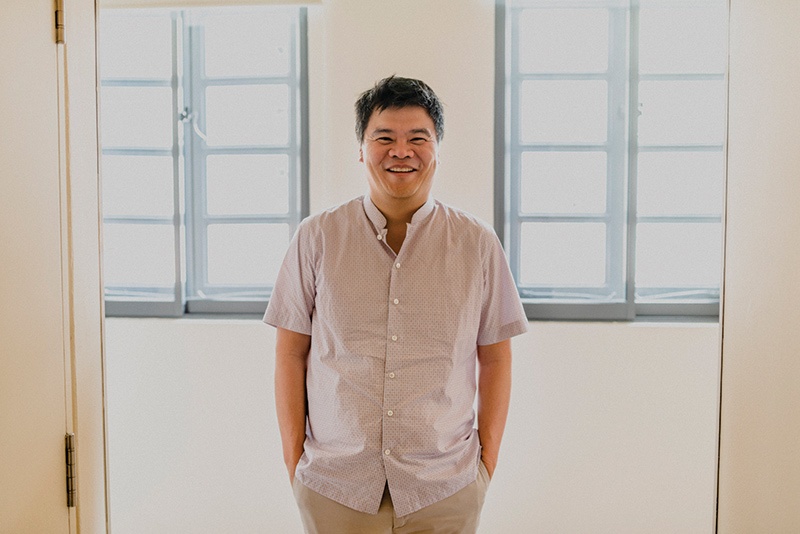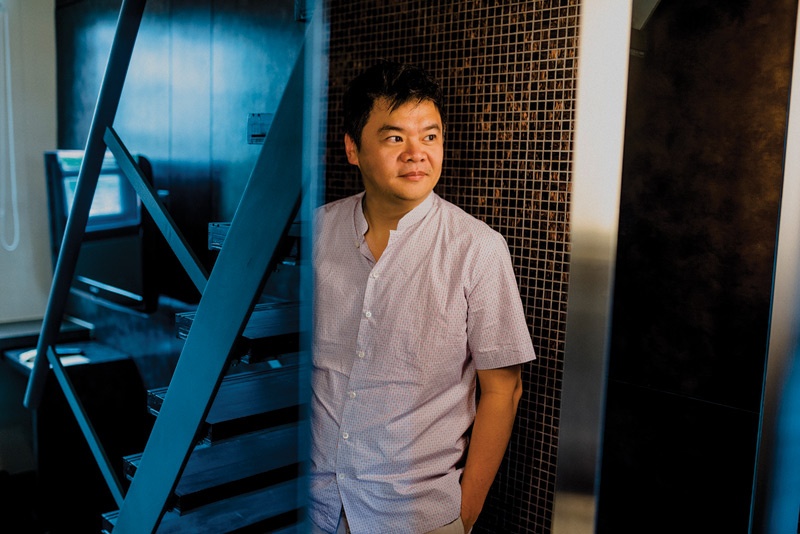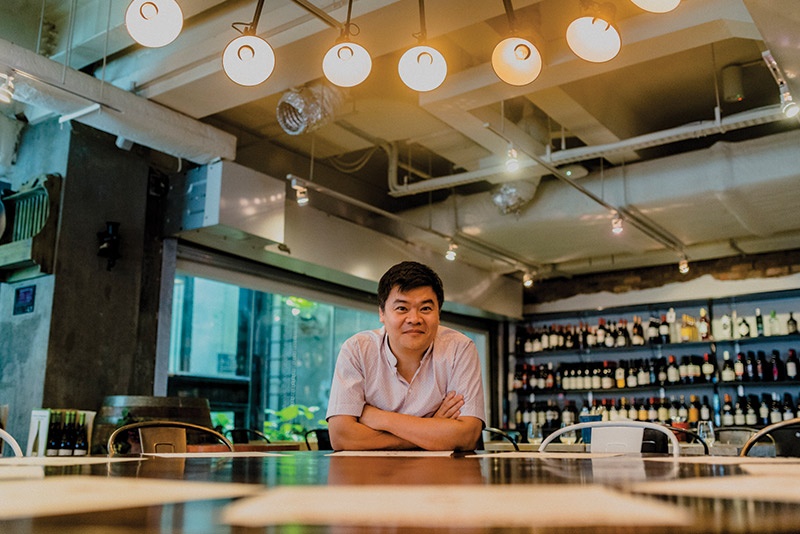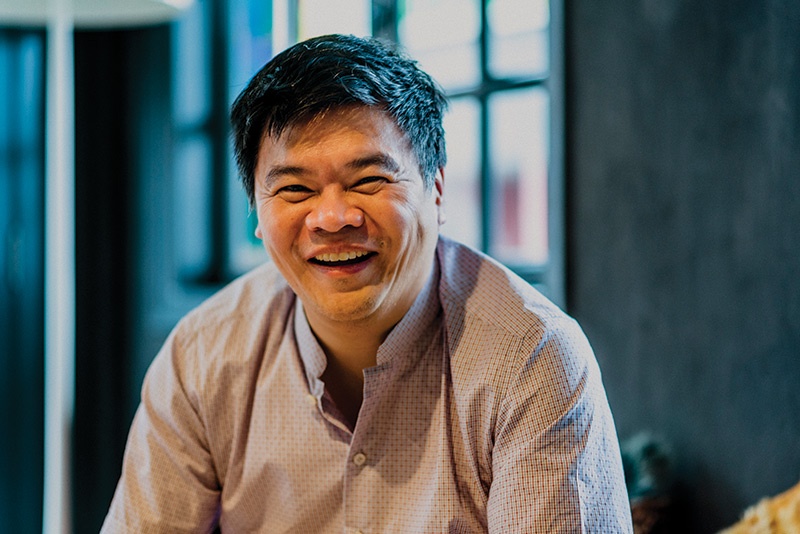Loh Lik Peng begins our conversation by letting me know that he’s looking to “get away with as little as [he] can” at the moment. It’s been a busy last couple of years for him, as the founder and Director of Unlisted Collection: an umbrella group of over 20 restaurants and 5 boutique hotel properties across destination cities such as London, Shanghai, Sydney and of course, Singapore, where Lik Peng is seen as a vanguard. His first project in 2003, Hotel 1929, involved refreshing and renewing a row of heritage shophouses in Keong Saik Road, giving them a new lease of life. Its boutique hotel concept was situated in a neighbourhood more famous then for its red-light businesses and a milieu that was markedly downmarket to the hotel’s prospective guests. Unprecedented on more than one level, it caused quite a stir in the local media and industry-wide peers. Today, it might seem unquestionable how the property has become a bona fide success, but the backstory of its survival is a testament to Lik Peng’s maverick flair. He opened during the SARS crisis—a catalytic move which engendered a market for boutique travel options in Singapore as well as the start of a string of hospitality establishments under Unlisted Collection. When I ask him about what gives him his notable instincts and tastes, he says, “I really like unique things that have a certain quirky quality about them. People are always amused by my collection of vintage barber chairs, because it offers a bit of nostalgia. I do try and pick what I think are pieces with personality and character, even if it is inanimate, like a chair.” Watching him affable, relaxed and sipping on an icy malt chocolate drink as he leans back on the sofa, it’s easy to imagine that work is being put on the back burner. But the sight belies the truth—prior to our meet up, Lik Peng’s PA called in the morning, asking to defer our interview with him by half an hour, in view of a work meeting. Despite a hectic schedule, it seems Lik Peng does have other priorities which he values over work. He tells me that he is heading back home for dinner with his family. In fact, the father of two young children, Conor (6) and Cassidy (2), makes it a point to be home every weekend even if he has to travel overseas. “I hope to be a good father and an attentive parent. I want to be remembered by my loved ones as a family man, not a hotelier. Besides your family, you're not likely to have as much impact on other people's lives. ”
A Candid Conversation with Loh Lik Peng
TEO REN FENG: Looking at your portfolio, you seem like a serial entrepreneur. What drives this?
LOH LIK PENG: I'm drawn to things. I like doing new projects and if I find something really cool… well, I'm the sort of person who isn't particularly interested in the running of something. I like creating—I really love the process of doing up a hotel for example, but once it's done, the day-to-day running of the place doesn't interest me as much. I struggle with that.
REN FENG: So how do you maintain a fresh perspective on your projects as they mature?
LIK PENG: That's always a tough one. Some projects—particularly hotels—I guess you have a horizon of 7 to 10 years from when you first design until the next refresh. We're just hitting the point of a 10-year cycle on projects like Hotel 1929 and the New Majestic Hotel, and we’ve been putting them to other uses. The latter is now being turned into a private club called Straits Clan. Perhaps I don't refresh so as much as raze everything in order to bring a completely new concept in.
REN FENG: What fuelled the decision to sell Hotel 1929?
LIK PENG: I realised that I took it as far as I could within a reasonable time frame. And frankly, I had to make the painful decision to sell it. It was my ‘first child’, and it took me a long time to decide, but ultimately it was the best decision from a business point of view.
REN FENG: What do you mean by you “took it as far as you could”?
LIK PENG: There are probably a lot of really cool products out there in the boutique hotel scene now, and the market is much more developed and diverse. So is a product like Hotel 1929 or The New Majestic as relevant as it was when we first opened it 10 to 12 years ago? They were very fresh, novel concepts when we first introduced them. But things are different now so the answer is, no… which is why I decided that we would do something else.
REN FENG: Is there anything new coming up for you then?
LIK PENG: I've been looking to get away with as little as I possibly can, so nothing new.
REN FENG: You have quite a list of establishments under you. Is it about consolidation at the moment?
LIK PENG: Kind of—and also just trying not to get too distracted with so many things that are going on right now. I think we've opened quite a few outlets over the last few years. I just want to slow down a little bit.
REN FENG: Do you think you've found success?
LIK PENG: Yes. In my own way, I guess. It is relative. There’s no real pinnacle, so for me, success is just something that you achieve at a particular point in time. Then you got to move on, and build the next thing.
I wouldn't say that my best years are behind me.
REN FENG: Do you still have any unfulfilled aspirations or dreams at this point?
LIK PENG: Oh, absolutely. There are many things that I still want to do and I would love to continue doing more hotels. I wouldn't say that my best years are behind me.
REN FENG: Ultimately, what gives you fulfilment in what you do?
LIK PENG: For me, operating in places like London, Sydney and Shanghai, and launching a really successful project there always gives me a bit more satisfaction because these are lifestyle capitals of the world. So it’s nice to be well-received in a cosmopolitan market. I think there's also a sense of achievement when you finish a difficult project. Projects like The Old Clare [Hotel] in Sydney, or Townhall [Hotel] in London were really difficult projects, and to get them over the line when everyone thought that we were nuts to take it on… creates a sense of satisfaction.
REN FENG: Your hotels are always sited in repurposed heritage buildings. It’s interesting how you pay great attention to keep the buildings in its original state with projects like The Old Clare Hotel or Wanderlust. However, your own personal tastes veer very much in the opposite direction, and is more modernist and bold. Where do you draw the line between the two?
LIK PENG: What I try to do with the buildings that I get is to preserve as much of its original patina, because I always feel that it's important to capture the spirit of a building. We don't do period buildings or period restorations; instead, we do modernist restorations. Nobody wants to use an old toilet or an old bed. It's nice to have a sense of an old building, but it's quite different living in an actual old building and having to use old things. If I put a chair, it can't be an uncomfortable 200-year-old hardback wooden deal. So I put in modern amenities—something sleek and luxurious, which appeals to my own taste—juxtaposed against the old fabric of the building.
REN FENG: You’re known for choosing unusual properties that turn out to be in very lucrative ‘up-and-coming’ neighbourhoods. How do you chance upon these potential sites?
LIK PENG: Partly doing my own walkabouts and also people presenting stuff to me. At one stage, people were presenting all sorts of weird properties to me, especially in red-light districts, since I was known to take them on. And 9 times out of 10, they are rubbish—probably only one in the mix is really cool, and you jump on it.
I won’t do something that is financially viable if I find it boring.
REN FENG: How do you sort the treasure from the trash?
LIK PENG: Sometimes it's obvious that they are just rubbish. I’ve been offered weird things before like a former asylum, which creeped me out. [laughs] Or old cinemas and warehouses that can't be turned into hotels since they don't have windows. I've also been offered things that are really cool, but don’t make any financial sense and it would just be too difficult. You also get the in-betweens where the project is just not exciting. I won’t do something that is financially viable if I find it boring. Because life's just too short for that, right? [laughs] We're looking for that sweet spot between financial viability and it being really cool and exciting.
REN FENG: I would like to bring up the wonderful interview that you did with Bharati Jagdish. Do you think that gentrification necessarily equals a loss of authenticity in an area?
LIK PENG: Not necessarily, but often it does.
REN FENG: What in your opinion makes up the heritage and culture of a people?
LIK PENG: I guess the things that bind people are common, shared experiences and memories. What you go through in daily life from the TV programmes that you watched as a child to the music that you grew up listening to. That's part of our culture, upbringing and identity as Singapore citizens, or citizens in any other part of the world for that matter. What's uniquely Singaporean is our experiences in school, National Service for guys, taking the MRT, and living in a HDB flat for the vast majority. Shared experiences that people can relate to, glue us together.
REN FENG: Do you try to foster that sort of experience in your properties?
LIK PENG: No. We don't try to foist it on anyone. I think for us the locality is important. I hope that people go out and explore the neighbourhoods, whether it's Bethnal Green in London or Chippendale in Sydney or Little India in Singapore. We always try to situate ourselves in very interesting local districts, where lots of locals hang out, and we hope our guests absorb a little bit of that. You never quite live the full local experience unless you're in some place for long, but it's good enough if you get a glimpse.
REN FENG: It's a fine balance between wanting to have a lively, organic local scene and the tourist numbers.
LIK PENG: It's easier to get away with it in international cities like Singapore, Hong Kong, London and New York, because they naturally already attract a large number of foreigners. It gets more complex in smaller places which are not necessarily designed to hold such crowds. You've read about places like Barcelona, Venice and Santorini in Greece really pushing back against the enormous influx of visitors to their cities. In the height of summer, cruise ships disgorge 30,000 visitors into Venice alone, daily. That’s half of the local population. I think these instances make the local and tourist relationship much more complicated, with the potential to have much more baleful influences.
REN FENG: What would you consider successful cases of the old and original integrating successfully with the influx of the new?
LIK PENG: They are always tinged with some losses, but I would say the areas that have done quite well are Harlem in New York and the East End of London like Bethnal Green and Shoreditch. They've managed to retain a certain level of grittiness. With every bit of change and/or gentrification introduced, the original inhabitants of the place would have lost an original segment of what they had. So where do we draw the balance? You can't satisfy everyone.
REN FENG: People bemoan the loss of places like old kopitiams and communities in Singapore, and consider us to be a "Disney-fied" version of Asia. As a tourist destination, would you say it’s still important for us to have some form of "street-cred" that we see in countries like Vietnam or Sri Lanka for example?
LIK PENG: We passed that point a long time ago. I think the perspective of the local user versus what a visitor sees is quite different. As a local, sure, we don't have the street food, but we still have hawker centres and traditional foods. If someone visits Singapore and goes to Vietnam or Myanmar after that, they would probably have the surface impression that they are much more vibrant than what we have here. But that’s because of our public hygiene systems and sanitary conditions which shape the way people eat. And there is just no economics for it, in terms of land and salaries. We have to accept that Singapore shouldn't be compared to places like Vietnam and Penang. We should be compared to Hong Kong. Is our street food scene really that bad? I don’t think so. It's just different from our neighbours, because our stage of development is very different. I don’t think that means anything less of our culture in any way. I would argue that our street food scene is equally vibrant, but it's just a lot less from the ground up. The quality of our ingredients and hygiene levels are far above, so you don't get the grittiness of street life.
REN FENG: Hong Kong still has that grittiness in places like Sham Shui Po.
LIK PENG: But a lot of it is disappearing. They have a huge problem with local foods disappearing because the vendors can't afford the rent. We are lucky that the Singapore government still regulates hawker centres, where the rents are moderated to some extent. But in Hong Kong, if you get priced out, you're out. And plenty of famous street and local restaurants have disappeared. They also have their own version of problems with gentrification. Every city faces it in a different way. I think Hong Kong still has some grit, as we do. But they are probably suffering way more than us in terms of disappearing trades, because we have some government intervention.
I am sentimental about projects, but at the end of the day, I recognise that I’m in an industry where there's only a finite period of time to make a significant impact or difference.
REN FENG: Would you ever sell out?
LIK PENG: Yes, at the right time and at the right moment. And that's not necessarily because you don't value it, but because you got to move on to other things. You never stand still. I am sentimental about projects, but at the end of the day, I recognise that I’m in an industry where there's only a finite period of time to make a significant impact or difference. As one door opens, another closes. Or should I say, when one door closes, another will open. I always look at it that way.
REN FENG: What would you like to be best remembered for, out of everything you've done so far?
LIK PENG: I don't really want to be remembered for any of my projects. It's about creating impact with whatever I'm doing at the moment. Nothing lasts forever, particularly if you run a hotel or restaurant. In 20 years, tastes will change and someone will hopefully do something equally ground-breaking.
REN FENG: Has your success and business growth felt more like a blessing or a burden, especially now that you have two children?
LIK PENG: No, it's never been a burden. It's definitely much more of a positive thing. Nobody really wants to go through life and not have successes, right? So each time you rack up a success, it always feels satisfying.
REN FENG: What has changed in your lifestyle after having children?
LIK PENG: I spend all my weekends with the kids now, and even when I travel overseas for work, I always make sure that I’m home on the weekends. It’s really about doing the ordinary things with them like going for breakfast, to the park, Science Centre, and on holidays... those are the precious things. You want to create your own memories with them, and it’s the one thing I value more than anything else. The things you do at work are often transactional by their very nature, and transient to some extent. Effectively, work is work, but family has become a priority in my life.
REN FENG: What do you hope to be for your children?
LIK PENG: I hope to be a good father and an attentive parent. I want to be remembered by my loved ones as a family man, not a hotelier. Besides your family, you're not likely to have as much impact on other people's lives.
****
Edited by Wy-Lene Yap





